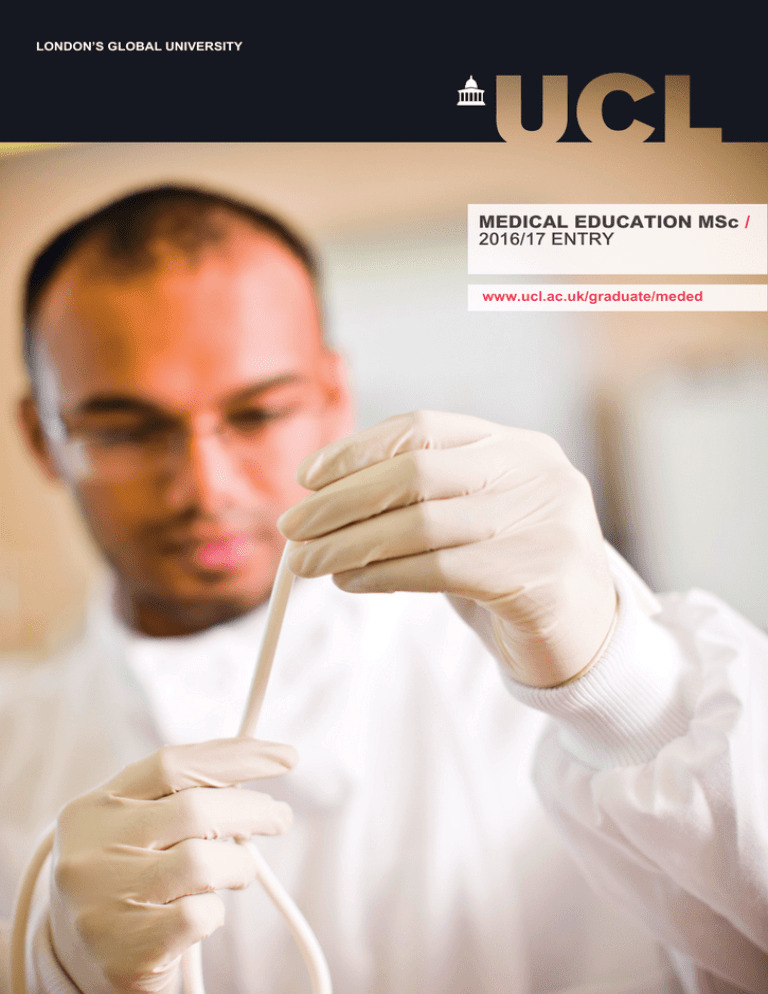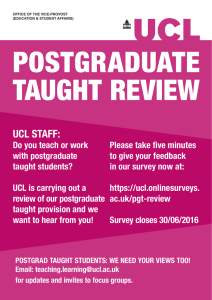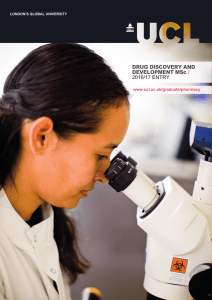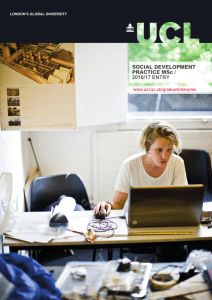MEDICAL EDUCATION MSc / 2016/17 ENTRY www.ucl.ac.uk/graduate/meded
advertisement

LONDON’S GLOBAL UNIVERSITY MEDICAL EDUCATION MSc / 2016/17 ENTRY www.ucl.ac.uk/graduate/meded Medical Education MSc / Designed by the Royal College of Physicians and UCL to meet the requirements of doctors who are intending to have a significant role in medical education, these programmes are taken sequentially starting with the Postgraduate Certificate in year one, the Postgraduate Diploma in year two, and finally the Master's in year three. Degree summary Participants develop the ability to: adopt a learner-centred teaching approach, structure teaching, and set objectives that enhance their students' learning; apply educational theory and research to their own teaching practice; recognise how assessment theory should inform practice in assessment of medical competence; and appraise both medical trainees and peers. // // // Degree structure Mode: Part-time: 3 years A Postgraduate Certificate comprising four core modules (60 credits, part-time one year) is offered in year one. A Postgraduate Diploma comprising eight core modules (120 credits, part-time two years) is offered. Students undertaking the full MSc take modules up to the value of 180 credits, comprising eight core modules (120 credits) and a research project (60 credits). A Postgraduate Diploma comprising of eight core modules (120 credits, part-time two years) is offered. A Postgraduate Certificate comprising of four core modules (60 credits, part-time one year) is offered. CORE MODULES // Teaching and Learning in Medicine I UCL Medical School co-ordinates developments in medical teaching and education and addresses curriculum development, academic standards, the assessment process, clinical and generic skills acquisition and research in medical education. // Teaching and Learning in Medicine II // Assessment in Medical Education // Educational Supervision and Clinical Teaching // Advanced Teaching Skills Our programmes, taught with the Royal College of Physicians, enable participants to gain greater knowledge of teaching and learning processes, develop practical skills and techniques, and gain a deeper understanding of the evidence and theory underpinning current thinking in medical education. // Research Methods in Medical Education // Course and Curriculum Design in Medical Education // Advanced Clinical Education Students benefit from the Jerwood Resource Centre, a world-class medical education library. Collaboration with the Royal College of Physicians attracts teaching input from experts from across the UK. The programmes are part-time, requiring onsite attendance only during the contact days of teaching sessions and tutorials, which include workshop style discussion and practical application 'simulation' sessions. Assessment is through evaluative reports, investigative study proposal and report, a viva during the final course and the dissertation. UCL regulations require attendance for 70% or more of the module's face to face teaching before a student is eligible to submit the assessment for that module. OPTIONS // There are no optional modules for this programme. DISSERTATION/REPORT // All MSc students undertake an individual research project which culminates in a dissertation of 15,000 - 20,000 words. Your career Whilst many clinical practitioners will continue to practise as doctors, this award carries with it the opportunity to develop a formal role in either undergraduate or postgraduate education. This programme has helped our graduates obtain high-quality posts as NHS consultants or academics in a university setting. Entry requirements Entry to the Postgraduate Certificate in Medical Education requires a primary medical qualification. Eligibility for the Postgraduate Diploma requires successful completion of the RCP/UCL Postgraduate Certificate in Medical Education. Eligibility for Master's level is dependent on successful completion of the RCP/UCL Postgraduate Diploma. English language proficiency level If your education has not been conducted in the English language, you will be expected to demonstrate evidence of an adequate level of English proficiency. The level of English language proficiency for this programme is: Good level. If your existing score is below this, please consider retaking the exam, as applicants with lower scores will not be accepted on the programme.. Information about the evidence required, acceptable qualifications and test providers is provided at: www.ucl.ac.uk/graduate/english-requirements FEES AND FUNDING // UK & EU (2016/17) entry: £2,175 (PT) // Overseas (2016/17) entry: £5,725 (PT) Fees note: This programme may be studied on a part-time basis only; the fee shown here is the part-time fee. Please note that the PG Cert and PG Dip must be completed before entry onto the MSc will be allowed. 2016 fees for the PG Cert (first year of study) are: Home/EU: £4,085*; Overseas: £13,950*; 2016 fees for the PG Dip (second year of study) are Home/EU: £4,085*; Overseas: £13,955*; 2016 fees for the MSc (third year of study are Home/EU: £2,385*; Overseas: £5,945*. *Fees are subject to confirmation Full details of funding opportunities can be found on the UCL Scholarships website: www.ucl.ac.uk/scholarships APPLICATION DATE All applicants: 29 July 2016 Your application Application is to the Postgraduate Certificate in the first instance. Successful completion of the one-year certificate leads to eligibility to study for a further year for the Postgraduate Diploma and success in the diploma leads to eligibility for a final year to study to Master's level. Together with essential academic requirements, the personal statement is your opportunity to illustrate whether your reasons for applying to this programme match what the programme will deliver. Because the programme is usually oversubscribed, we use your personal statement as a method of ranking applicants. This ranking takes into consideration: // your current and prior involvement in education and training (with recognition for applicants who teach over and above the usual requirement) // evidence of interest in medical education (with recognition for applicants who have undergone prior training in medical education, or have published in the area) // your ability to write to an academic standard in English (with penalties for multiple grammatical and spelling errors) Details on how to apply are available on the website at: www.ucl.ac.uk/graduate/apply PDF Updated: May 25, 2016 Information correct at time of going to press. See website (www.ucl.ac.uk/medicalschool) for latest information CONTACT Email: postgraduate@rcplondon.ac.uk Telephone: +44 (0)20 3075 1562


